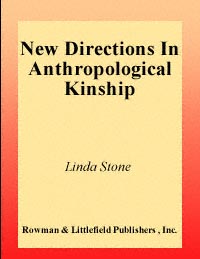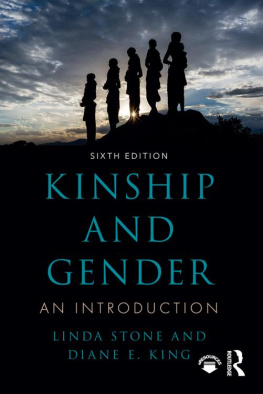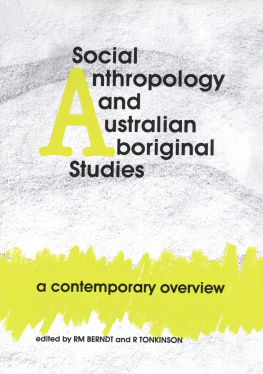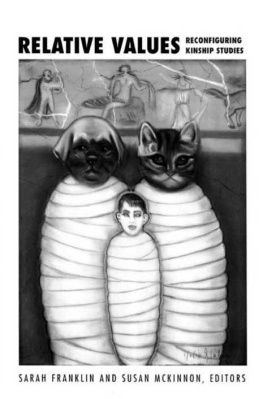Cover

| title | : | New Directions in Anthropological Kinship |
| author | : | Stone, Linda |
| publisher | : | Rowman & Littlefield |
| isbn10 | asin | : | 0742501078 |
| print isbn13 | : | 9780742501072 |
| ebook isbn13 | : | 9780585384245 |
| language | : | English |
| subject | Kinship. |
| publication date | : | 2001 |
| lcc | : | GN480.S83 2001eb |
| ddc | : | 306.83 |
| subject | : | Kinship. |
Page i
NEW DIRECTIONS IN ANTHROPOLOGICAL KINSHIP
Page ii
Page iii
NEW DIRECTIONS IN ANTHROPOLOGICAL KINSHIP
Linda Stone, Editor
ROWMAN & LITTLEFIELD PUBLISHERS , INC .
Lanham Boulder New York Oxford
Page iv
ROWMAN & LITTLEFIELD PUBLISHERS, INC.
Published in the United States of America by Rowman & Littlefield Publishers, Inc. 4720 Boston Way, Lanham, Maryland 20706 www.rowmanlittlefield.com
12 Hid's Copse Road
Cumnor Hill, Oxford OX2 9JJ, England
Copyright 2001 by Rowman & Littlefield Publishers, Inc.
All rights reserved . No part of this publication may be reproduced, stored in a retrieval system, or transmitted in any form or by any means, electronic, mechanical, photocopying, recording, or otherwise, without the prior permission of the publisher.
British Library Cataloguing in Publication Information Available
Library of Congress Cataloging-in-Publication Data
Stone, Linda, 1947
New directions in anthropological kinship / Linda Stone.
p. cm.
Includes bibliographical references and index.
ISBN 0-7425-0107-18 (alk. paper) ISBN 0-7425-0108-6 (pbk. : alk. paper)
1. Kinship. I. Title.
| GN480 .S83 2000 | 00040303 |
| 306.83dc21 |
Printed in the United States of America
 The paper used in this publication meets the minimum requirements of American National Standard for Information SciencesPermanence of Paper for Printed Library Materials, ANSI/NISO Z39.481992.
The paper used in this publication meets the minimum requirements of American National Standard for Information SciencesPermanence of Paper for Printed Library Materials, ANSI/NISO Z39.481992.
Page v
Contents
Preface | ix |
1 Introduction: Theoretical Implications of New Directions in Anthropological Kinship | 1 |
Linda Stone |
PART ONE: Kinship in the History of Anthropology |
2 Whatever Happened to Kinship Studies? Reflections of a Feminist Anthropologist | 21 |
Louise Lamphere |
3 Not That Lineage Stuff: Teaching Kinship into the Twenty-First Century | 48 |
Caroline B. Brettell |
PART TWO: Biology and Culture in the Study of Kinship |
4 Ties That Bond: The Role of Kinship in Primate Societies | 71 |
Joan B. Silk |
5 Neoevolutionary Approaches to Human Kinship | 93 |
Barry S. Hewlett |
6 Schneider Revisited: Sharing and Ratification in the Construction of Kinship | 109 |
Kathey-Lee Galvin |
Page vi
PART THREE: Kinship and New Reproductive Technologies |
7 Bound by Blood? New Meanings of Kinship and Individuality in Discourses of Genetic Counseling | 125 |
Lynn kesson |
8 The Threatened Sperm: Parenthood in the Age of Biomedicine | 139 |
Susanne Lundin |
PART FOUR: Kinship and Gender |
9 Mischief on the Margins: Gender Primogeniture, and Cognatic Descent among the Maori | 156 |
Karen Sinclair |
10 Power, Control, and the Mother-in-Law Problem: Face-Offs in the American Nuclear Family | 175 |
Allen S. Ehrlich |
11 Colliding/Colluding Identities: Race, Class, and Gender in Jamaican Family Systems | 185 |
Lisa M. Anderson-Levy |
12 Kin and Gender in Classic Maya Society: A Case Study from Yaxchiln, Mexico | 204 |
Cynthia Robin |
PART FIVE: New Family Forms and New Formulations of Family |
13 Parenting from Separate Households: A Cultural Perspective | 229 |
David Jacobson, Joan H. Liem, and Robert S. Weiss |
14 Open Adoption: Extending Families, Exchanging Facts | 246 |
Judith S. Modell |
15 In the Name of the Father: Theology, Kinship, and Charisma in an American Polygynous Community | 264 |
William Jankowiak |
16 Fictive Kinship in American Biomedicine | 285 |
Richard E. Maddy |
Page vii
PART SIX: Kinship and the Politics of Nations |
17 Going Nuclear: New Zealand Bureaucratic Fantasies of Samoan Extended Families | 303 |
Ilana Gershon |
18 Women's Organizations, the Ideology of Kinship,and the State in Postindependence Mali | 322 |
Rosa De Jorio |
Index | 341 |
About the Contributors | 354 |
Page viii
Page ix
Preface
 his book attests to a revival of kinship in anthropology. Even Scheider,whose own work contributed to the demise of kinship in the 1970s and (Even Schneider,)1980s, remarked in the 1990s that kinship had risen from its ashes (1995: 193). There are different reasons for this revival, some explored in this volume. In addition to those, it may well be, as Holy (1996: 165) suggested, that too much theoretical effort has been invested in kinship for its abandonment to be realistic, or as Parkin noted, to neglect kinship is to disregard a good deal of what any society explicitly recognizes (1997: ix). In any case, kinship in anthropology has changed significantly since mid-century and it is headed in interesting new directions.
his book attests to a revival of kinship in anthropology. Even Scheider,whose own work contributed to the demise of kinship in the 1970s and (Even Schneider,)1980s, remarked in the 1990s that kinship had risen from its ashes (1995: 193). There are different reasons for this revival, some explored in this volume. In addition to those, it may well be, as Holy (1996: 165) suggested, that too much theoretical effort has been invested in kinship for its abandonment to be realistic, or as Parkin noted, to neglect kinship is to disregard a good deal of what any society explicitly recognizes (1997: ix). In any case, kinship in anthropology has changed significantly since mid-century and it is headed in interesting new directions.
This book grew out of a conference panel, New Directions in Kinship Studies, at the 1997 meeting of the American Anthropological Association in Washington, D.C. Though the conference papers were all by cultural anthropologists, as are most of the chapters in this book, kinship has been also receiving attention from anthropologists in other subdisciplines. I then decided to broaden the book to include contributions from archaeology, primatology, evolutionary anthropology, and sociolinguistics, aiming to approximate an anthropological four field approach to contemporary kinship. Sociolinguistics is the only subfield from which, unfortunately, I did not find contributors.
Next page






 The paper used in this publication meets the minimum requirements of American National Standard for Information SciencesPermanence of Paper for Printed Library Materials, ANSI/NISO Z39.481992.
The paper used in this publication meets the minimum requirements of American National Standard for Information SciencesPermanence of Paper for Printed Library Materials, ANSI/NISO Z39.481992. his book attests to a revival of kinship in anthropology. Even Scheider,whose own work contributed to the demise of kinship in the 1970s and (Even Schneider,)1980s, remarked in the 1990s that kinship had risen from its ashes (1995: 193). There are different reasons for this revival, some explored in this volume. In addition to those, it may well be, as Holy (1996: 165) suggested, that too much theoretical effort has been invested in kinship for its abandonment to be realistic, or as Parkin noted, to neglect kinship is to disregard a good deal of what any society explicitly recognizes (1997: ix). In any case, kinship in anthropology has changed significantly since mid-century and it is headed in interesting new directions.
his book attests to a revival of kinship in anthropology. Even Scheider,whose own work contributed to the demise of kinship in the 1970s and (Even Schneider,)1980s, remarked in the 1990s that kinship had risen from its ashes (1995: 193). There are different reasons for this revival, some explored in this volume. In addition to those, it may well be, as Holy (1996: 165) suggested, that too much theoretical effort has been invested in kinship for its abandonment to be realistic, or as Parkin noted, to neglect kinship is to disregard a good deal of what any society explicitly recognizes (1997: ix). In any case, kinship in anthropology has changed significantly since mid-century and it is headed in interesting new directions.